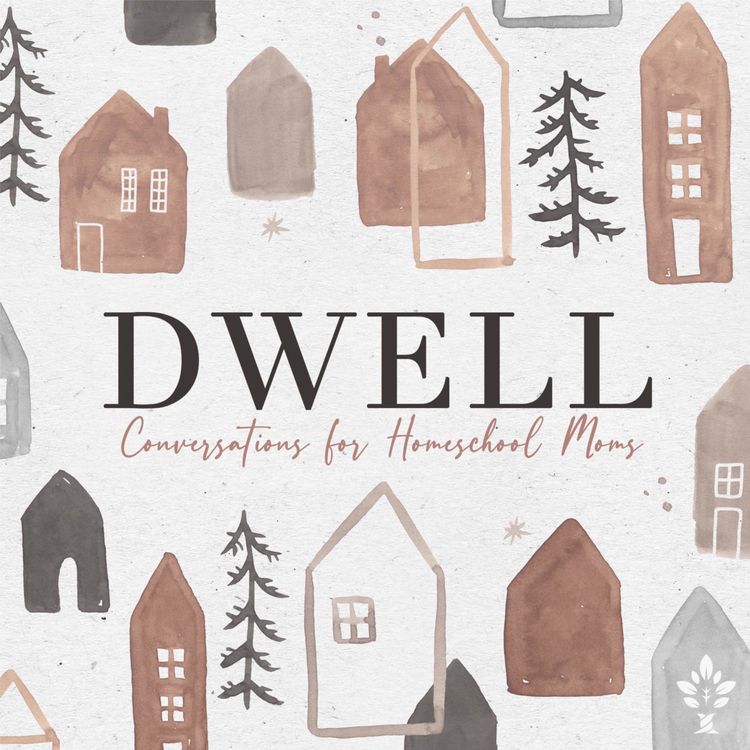Share

Dwell
Katherine Briggs, Teacher and Writer
Ep. 78
•
Today on Dwell, Renee talks with Katherine (Katie) Briggs, a middle-school teacher, author, and one of her former students. They talk about encouraging young writers as well as what it is like to have your first book published.
See more about Katherine:
Instagram at katherinebriggs_author
More episodes
View all episodes

129. Favorite books of 2025!
48:28||Ep. 129Sometimes it is helpful to hear what other people are reading, their favorite books and authors, to be inspired to pick up a new book. We hope you enjoy this episode in which we share our favorites!
128. Sign Them Up! Sports and the Homeschool Family
34:22||Ep. 128Listen as Renee and Karen chat with guest, Amanda Kenter, who makes a convincing case for the importance of sports and physical activities in the formation of our kids. She explains the benefits of sports and how you can fit them in with your family dynamics, goals, and time commitments.
127. Can the Principles of Classical Education Offer Strategies to Help with ADHD?
38:55||Ep. 127In this episode, Renee and Karen answer a question from a listener about ADHD. They offer advice from their own experiences and from the principles of Charlotte Mason and Classical Education: keep lessons short, get outside, train habits, limit devices, and remember your child isn't a problem to be solved.
126. Furthering your Own Education as a Busy Homeschool Mom
33:56||Ep. 126Listen as Renee and Karen talk with guest, homeschool mom Krista Sanders, about her journey to enrich her own intellectual life. She reflects on how it started when, as a mom of young boys, she asked herself, "What is education?" That eventually led her to the CiRCE Apprenticeship and then Belmont Abbey College, where she has recently completed her Master of Arts in Classical and Liberal Education. You may not be at the stage in life where you can enter a formal program, but she will encourage you to enrich your own life with books and reading in community.
125. You can teach a foreign language!
38:05||Ep. 125Does the thought of teaching a foreign language in your homeschool intimidate you? Join us as Laura Councell gives us tips, ideas, and resources for learning with your children, using familiar books translated into another language and adding just a few phrases at a time. You will be inspired to wade in at the shallow end and give it a try.
124. Tell Your Stories!
32:19||Ep. 124In this episode, Renee and Karen chat with guest, Holly Schurter, long-time storyteller and great-grandmother, about how telling our stories builds a rich family culture and reminds us that grace is in the everyday. Follow her on Substack to read her articles!
123. Teaching Science in the Kitchen
28:48||Ep. 123Angela Smith, founder of Inquisicook, an online culinary arts and science program for students ages 12 and up, joins Renee and Karen to chat about the science of cooking and about encouraging your children to help you in the kitchen. It may get messy, but the benefits to your child's formation and your family culture are immeasurable. Angela also shares that Inquisicook Jr. is coming soon. Listen to hear how it could enrich your children's education.Inquisicook.comInquisicook Instagram
122. Keeping Spirits Bright
27:17||Ep. 122It's Christmas Time, and we know so much rests on mom to make it all happen: shopping, wrapping, baking, decorating... Renee and Karen offer ideas and tips to help keep the season stress-free and to enjoy your family traditions with a joyful spirit.
121. Talking Poetry with Christine Perrin
38:57||Ep. 121In this episode, friend and colleague in the world of classical education, mom and grandmother, teacher and poet, Christine Perrin, joins us for a discussion on how to foster a love of poetry in our children. She says that the experience of poetry comes before the analysis of it, she offers tips on how to jump into the world of poetry, and she shares her favorite volumes and poets with us.